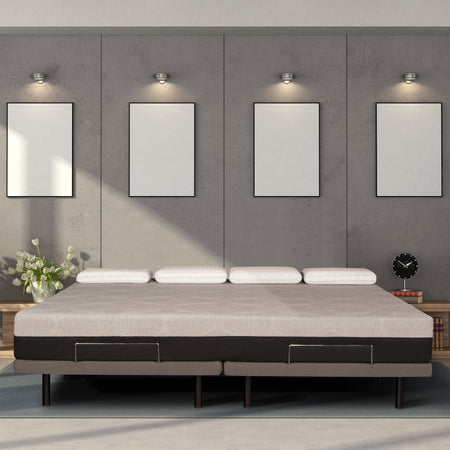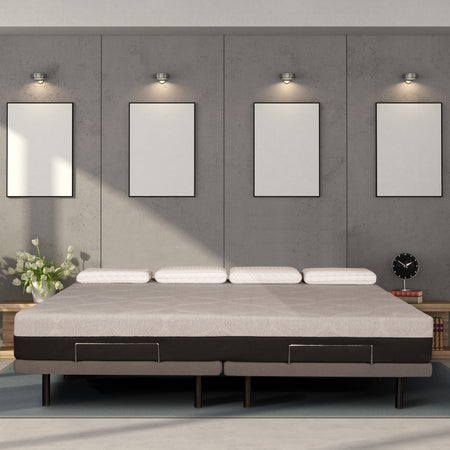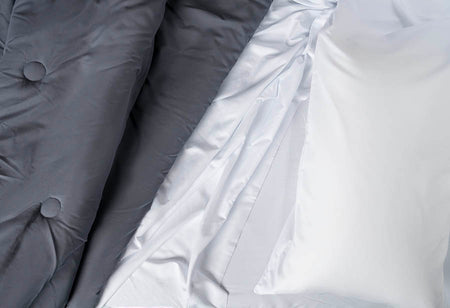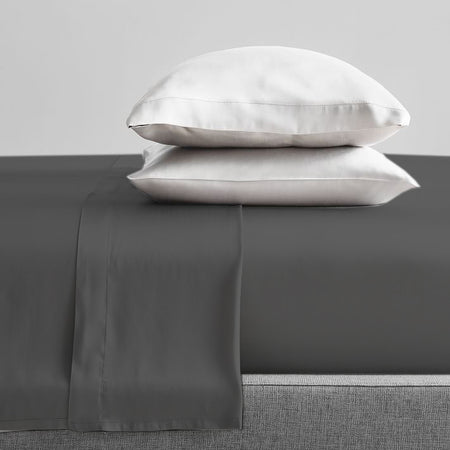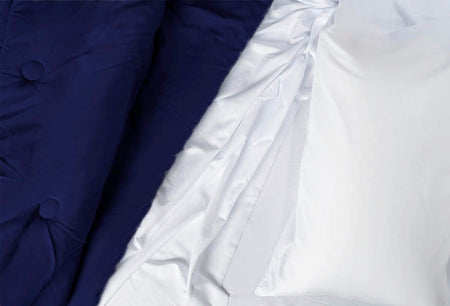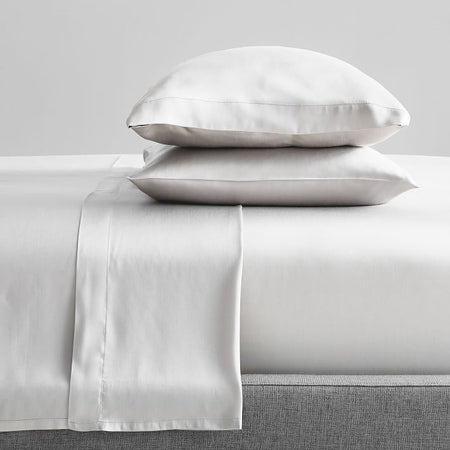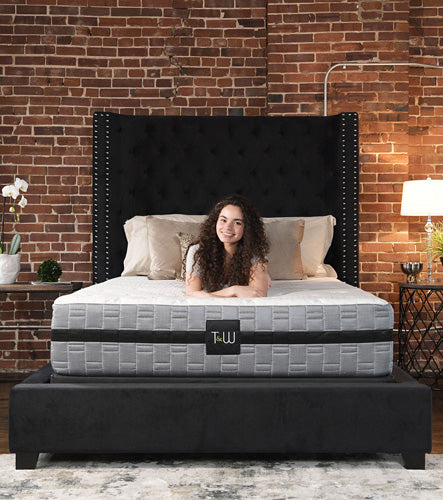When it’s time to turn in for the night, do yourself a favor and engage all 5 senses to experience a better quality of sleep. You might already be aware of the importance of limiting light and noise exposure to sleep better, but you might not know just how touch impacts your overall quality of sleep. You’re in luck, because Bedding Mart and the National Sleep Foundation are here to show you how to engage sight, smell, touch, taste and hearing to drift off and wake up feeling rested and refreshed.
Examining Sleep Through the Five Senses
There’s more to getting a good night's’ rest than having the right mattress and going to bed at the right time, although those are great places to start. We recommend taking five steps further with all your senses by:
- Sleeping in comfortable pajamas and finding the perfect temperature that encourages sound sleep for your sense of touch. You might also want to consider a different type of mattress that offers better airflow for maximum comfort.
- Keeping the amount of clutter you see in your room to a minimum to keep from engaging your brain more than necessary when it’s time for bed. Additionally, keep the lights and brightness in your bedroom to a minimum.
- Reducing the volume of sound in your bedroom to better facilitate restful slumber.
- Adding a relaxing scent to your room and ensuring you keep bad odors out also boosts sleep quality.
- Making sure you don’t eat anything before bed that you know causes you heartburn or upset stomach or might keep you up.
Contact Us
While the above tips can most certainly go a long way in helping you sleep better, there’s no denying the importance of knowing the right way to navigate a selection of mattresses. Help is just a phone call away with Bedding Mart. Dial 1-888-543-5125 to learn more about our exemplary selection of bedding and mattresses.
Updated 8/31/2021:
The 5 Senses and How to Use them to Sleep Better
It is easy to overlook the importance of sensory cues during sleep because sleep makes us oblivious of the outside world. However, you can likely remember a time when some noisy neighborhood party made it hard to catch some sleep. Or when you couldn’t sleep because your mattress slept hot and the temperatures were just unbearable. According to experts, our senses – touch, smell, sight, taste, and hearing –have the potential to influence sleep.
Read on to find out how the five senses affect sleep and how you can improve your sleep using these senses.
The sense of touch

The skin is a very clever organ. It responds to touch and also sends sensory messages regarding vibration, temperature, and pain. So, if your bedroom’s temperature is too high or your beddings are rough, your skin will sense that and notify the brain about the same. This is what makes sense of touch, a very critical element of your sleep hygiene.
How to use the sense of touch for better sleep
The physical comfort of your space can make or break your sleep as it directly affects your sense of touch. Physical comfort includes anything from pajamas to room temperature to the type of mattress and pillows, etc. If your skin senses discomfort, you’ll have a hard time falling and staying asleep throughout the night. Here are a few things you can do to ensure physical comfort:
- Invest in a good quality mattress – preferably one that contours your body and adapts to the room temperature. Memory foam mattress, for instance, offers body-hugging comfort, superior motion absorption, pressure relief and is ideal for all sleeping positions. However, it sleeps hot. On the other hand, hybrid mattresses offer support and sleep cool.
- Find comfortable pajamas – shouldn’t be too tight or heavy. It should also wick off moisture.
- Regulate your room temperature – doctors recommend keeping it between 60 to 67 degrees Fahrenheit for the most comfortable sleep.
- Change your beddings to match the seasons – like cotton wool sheets in summer and flannel or cozy jersey sheets in winter.
The sense of smell
The human nasal cavity has special cells, known as olfactory neurons, which pick-up chemical signals from compounds in the environment. These neurons connect to the brain, allowing for rapid identification of smells depending on the stimulated neurons.
Thanks to the power of the sense of smell, some fragrances may contribute to better sleep. Pleasant scents like lavender, rose, jasmine, chamomile, and wood, promote relaxation, making it easier to fall and stay asleep. But foul smell makes you queasy.
How to use sense of smell for better sleep
A 2012 Bedroom Poll by National Sleep Foundation found that 78% of participants were more excited for bed when their beddings had a fresh scent. So, something as simple as washing your sheets with a fabric softener can work the magic. You can also:
- Avoid uplifting smells like lemon, cinnamon, or peppermint that keep you awake.
- Go for lavender scent as some studies suggest it lowers heart rate and blood pressure, producing a calming effect.
- Air out your pillows to freshen and maintain them.

The sense of hearing
Sounds are essential during the day but can become bothersome at night, especially when they’re sudden or loud. Even if it doesn’t wake you up fully, noise still disrupt a good sleep and affect the circadian rhythm.
The hair cells in the ear pick up noises from different sources, including traffic, storms, city noise, TV, radio, or even pets. In some cases, the noise can come from a bed partner with sleep problems like sleep apnea. Sleep apnea is a sleep disorder that causes one to repeatedly stops and starts breathing and is characterized by loud snoring.
How to use hearing sense for better sleep
A Noise & Health journal review shows a connection between nighttime environmental noise and heart disease. It’s, therefore, a good idea to block out as much external noise as you possibly can. For instance, you can:
- Place your bed away from outside walls, seal window, and door gaps, and invest in double-pane windows.
- Use earplugs if you live in a very loud space.
- Add relaxing noise to your environment. Download an app that produces soft-static sound (like quiet rainfall or gentle ocean) or get a white noise machine known to help block out unwanted noises and promote better sleep.
The sense of taste
While you don’t eat or drink during sleep, the things you consume throughout the day can impact sleep quality. Certain diets can make it easier or hard to fall asleep. But at the same time, getting enough sleep is linked to maintaining healthy body weight. Knowing the link between nutrition and sleep helps you optimize both to sleep better, eat smarter and live a healthier life.
How to use the sense of taste for better sleep
About 78% of Americans consume at least one caffeinated drink each day, which plays a huge role in sleeplessness. Caffeine might be good for the taste buds but can disrupt your sleep-wake cycle. You also want to:
- Steer clear of alcohol, fatty foods, and those packed with lots of sugar, especially close to bedtime. Sugary foods give you energy and cause you to stay awake. On the other hand, garlicky or spicy foods can cause digestion issues that disrupt sleep.
- Instead, opt for foods that improve sleep – like chamomile tea, tart cherry juice, avocados, almonds, etc.
- Try to eat at least three hours before bedtime to reduce the effects of acid reflux.
- Take sleep medicines as prescribed by the doctors
The sense of sight

Light is the most external factor affecting sleep. It helps regulates the circadian rhythm and also affects the production of the sleep-promoting hormone melatonin. And while many people align their sleep patterns to the natural day and night, electricity and gadgets often get in the way. Electricity creates an abundance of light that alters the circadian system and halts the production of melatonin.
How to use the sense of sight for better sleep
Artificial light interferes with natural sleep patterns. Therefore, it’s a good practice to make your room as dark as possible for healthy sleep. Here are some sleep habits that you can try out:
- Invest in quality sleep mask or blackout curtains to block out the light – especially if you’re the type that takes daytime naps
- Reduce screen time hours before bedtime to avoid blue light that suppresses the production of melatonin
- Use calming colors like muted greens and blues in the bedroom.
Sleep deprivation can compromise your senses and overall wellbeing. It’s therefore a good idea to make your bedroom as comfortable as possible. You should also work on your sleep hygiene to make it easier to fall and stay asleep.


